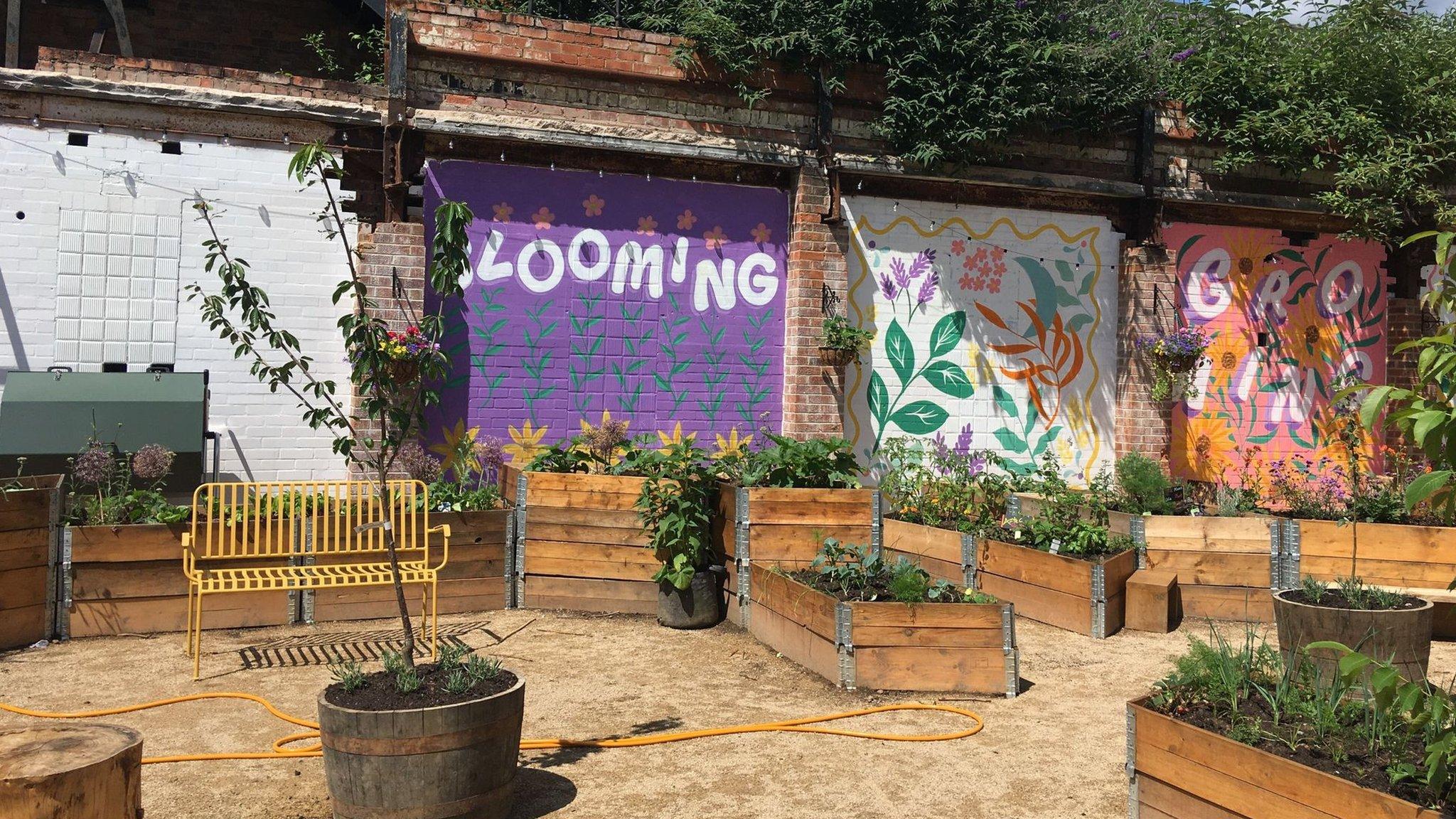Hull: The city set to give people the 'right to grow'
- Published
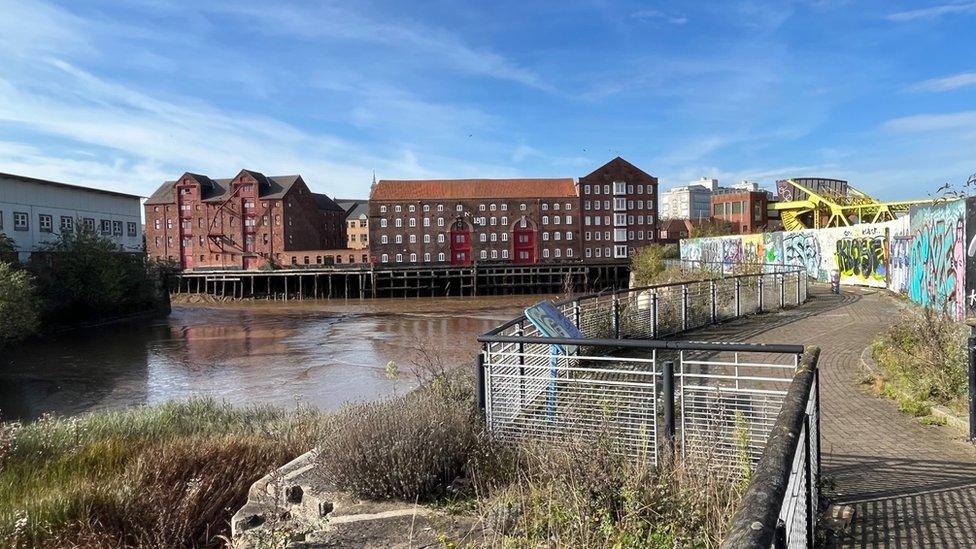
Rooted in Hull, which teaches people how to grow produce in urban areas, overlooks the River Hull in the city's industrial heartland
Hull looks set to become the first UK city to give people the "right to grow" food on disused council land.
Council bosses say the move would bring communities together, reduce antisocial behaviour and make places look better, as well as put quality food on dinner plates.
As campaigners call for the idea to be adopted nationally, BBC News visited one Hull-based community group that is ahead of the curve, growing healthy food in the shadows of factories.
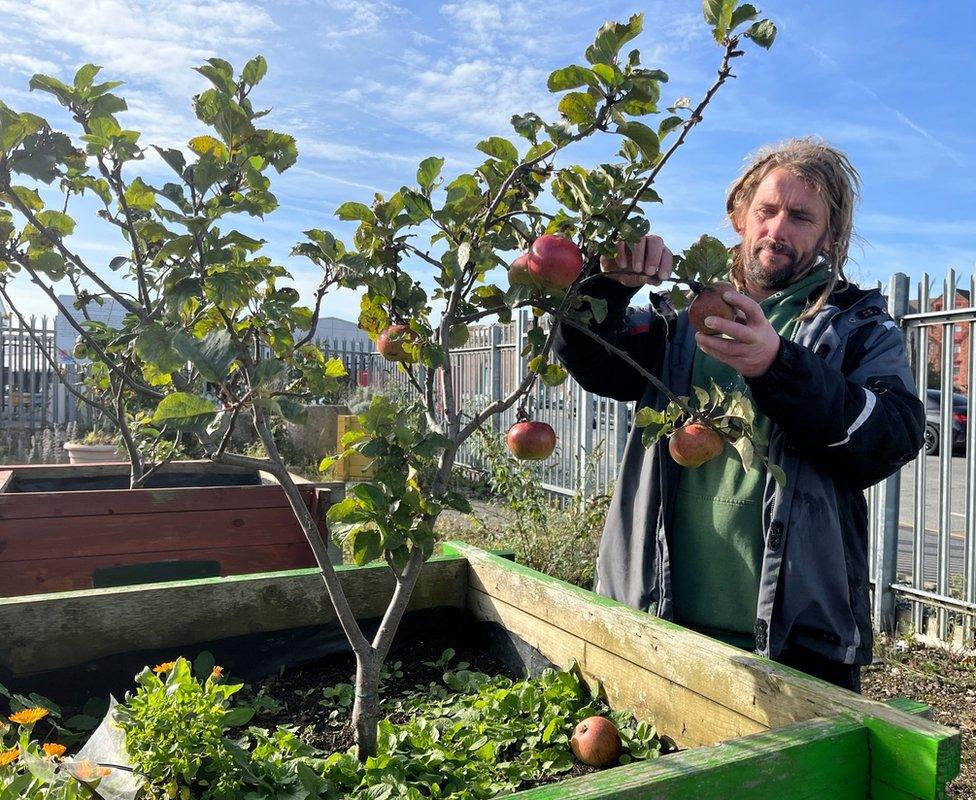
Martin King, manager of Rooted in Hull, inspects the produce
Flanked by security fencing, with the air carrying a scent of heavy industry, it is perhaps an unusual place to find fruit and vegetables growing.
Yet, in multiple raised beds on a gravelled patch of land off St Peter's Street, plants flourish, irrigated using a system which collects and stores rainwater from the roof of the Royal Mail's sorting office next door.
Stopping to inspect an apple tree as an HGV rattles by, Martin King, manager of Rooted in Hull, a not-for-profit community organisation, said staff and volunteers have proven food can be grown almost anywhere.
"You don't need a lot at all," he says, grinning. "Joinery students at Hull College made the raised beds for us."
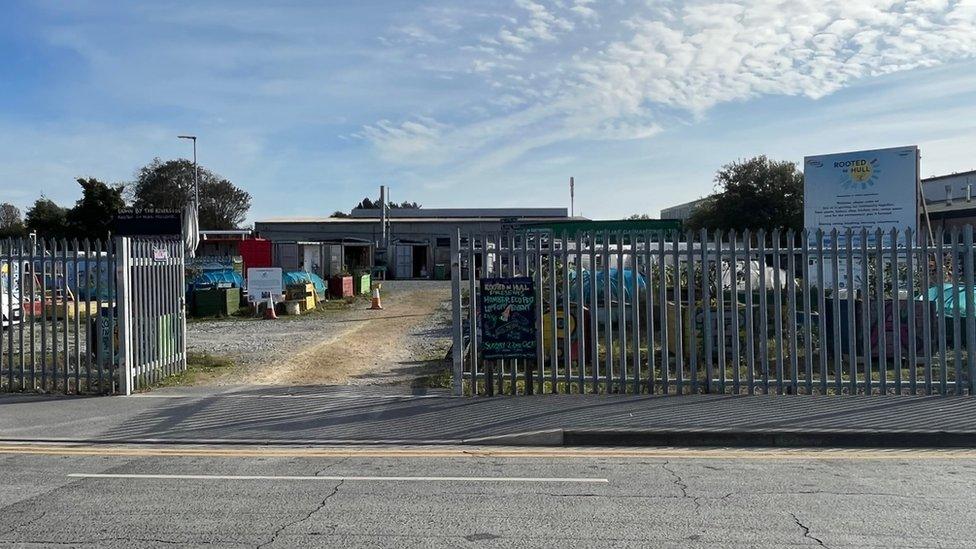
Rooted in Hull moved on to its patch, located on a filled-in basin, in 2015
The organisation acquired the land in 2015, with Mr King explaining it was once a basin used to hold ships delivering timber to a nearby dock. A stipulation of the lease, he told me, is that no foundations must be dug, hence the presence of containers, a compost toilet and even a reed bed that filters dirty dishwater.
"The purpose of Rooted in Hull is to teach people about growing food in urban environments," Mr King adds.
He is, therefore, naturally supportive of Hull councillors who recently unanimously passed a "right to grow" motion.
If approved by the city council's scrutiny committee, a map would eventually be produced showing suitable land it owns that could be used by those who want to grow their own fresh food.
Hull would become the first city in the UK to give people a right to grow on unused council land - and that's an exciting proposition for Mr King who says it's a golden opportunity "to be a pioneering city".
"I think Hull being awarded City of Culture in 2017 sparked something. People are now thinking outside the box."
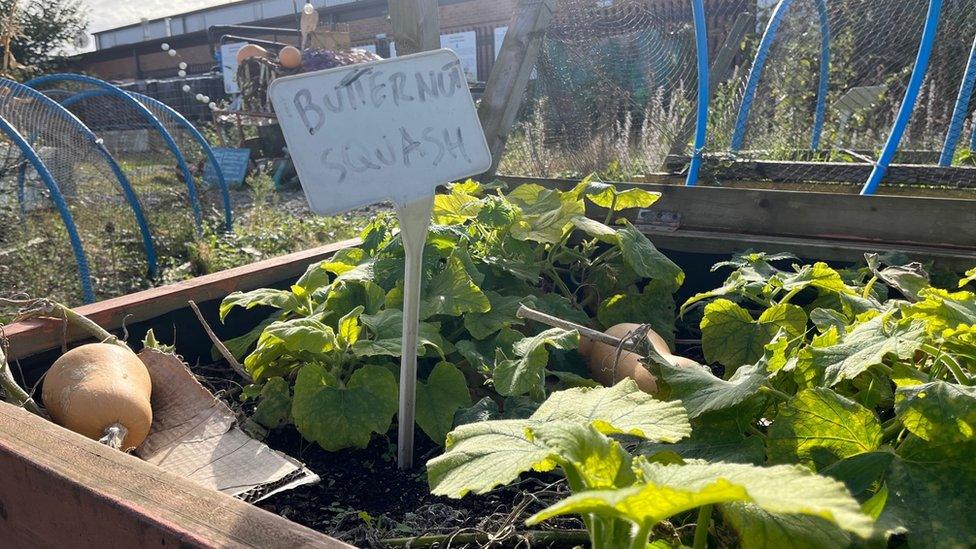
Rooted in Hull uses containers, made by college students, to grow their produce
Inside a grocery box before us is an abundance of autumnal vegetables destined for the dinner plates of volunteers.
Glancing over the road towards the muddy banks of the River Hull, he says: "Let's wash away the idea that Hull is some rundown backwater."
Incredible Edible, a network of more than 150 community growing groups, is pressing for more councils to do the same. The group insists unused land could "with a little TLC be turned into oases for food and wildlife".
Councillor Gill Kennett, who tabled the Hull motion, believes the move would help those struggling in the cost of living crisis.
"Land already earmarked for building in the future could be temporarily used to grow food," she says. "Years pass before the foundations are laid and fruit and vegetables could be grown over several seasons."
Councillor Mark Ieronimo, the council's infrastructure portfolio holder, says the city is "blessed with green areas", adding there are also spaces that are no longer used, such as former car parks.
"It's hard to grow your own food," he explains. "I know because of the amount of tomatoes I've lost over the years is incredible.
"But this will bring people together and it'll improve mental health and reduce food waste."
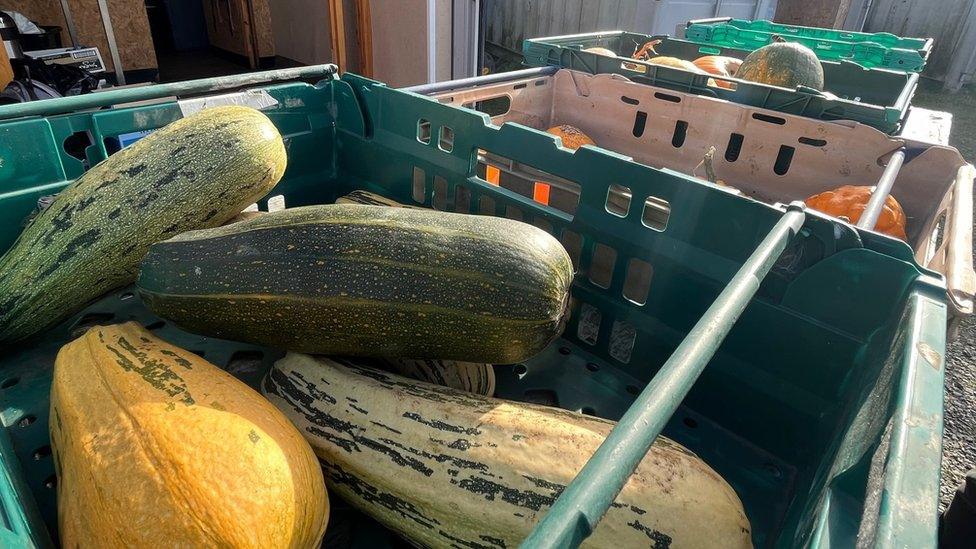
Volunteers get to keep the produce they grow
Back at Rooted in Hull, two volunteers beaver away, weeding and removing the remains of wilted, summer crops. Kale and butternut squash are in plentiful supply.
Mr King agrees community gardening projects such as this one can help boost mental wellbeing. He says the group works with many vulnerable members of society, including Hull All Nations Alliance (HANA), which helps refugees.
"We had a group of kids from HANA come down," he points out. "They made chips and pizzas using produce grown here. We help tackle social isolation."
At the back of the yard, there are three beehives.
"A man serving a sentence at HMP Hull used his graphic skills to design labels for the honey," Mr King informs me.
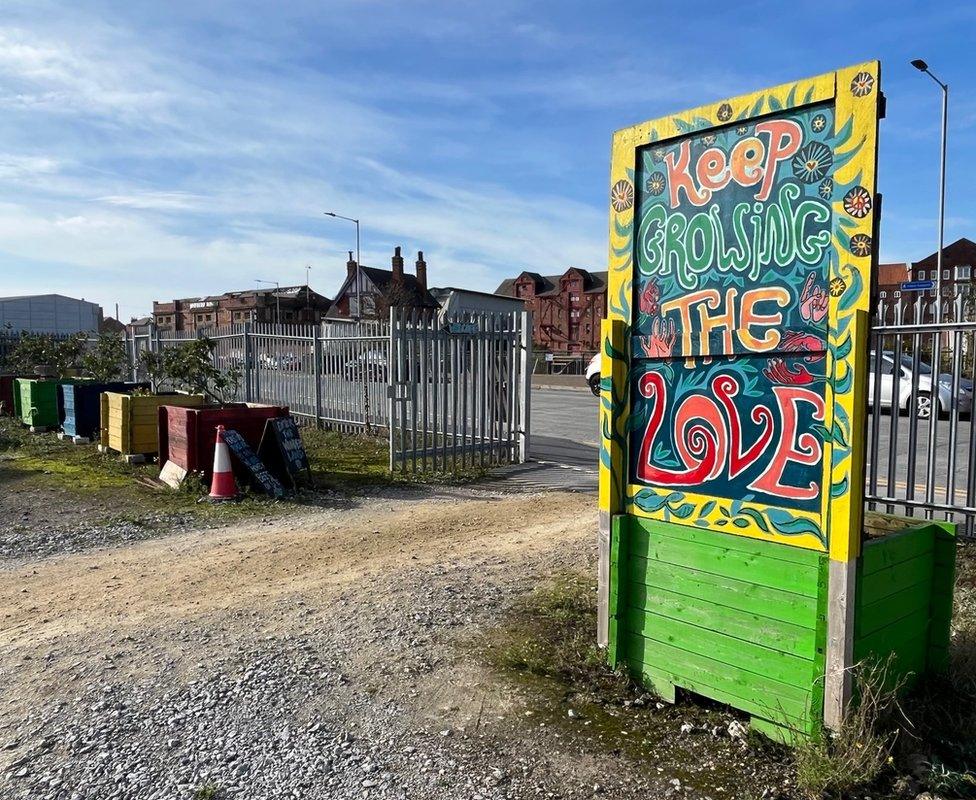
The message is loud and clear for those exiting Rooted in Hull
Mr King is content, but conscious that more spaces, not just in Hull, could be used in a similar way for food production.
"I'm really proud of what we've achieved here," he says. "We've brought people together and created a really beautiful, innovative project. We've created a model here that can be replicated anywhere."

Follow BBC East Yorkshire and Lincolnshire on Facebook, external, X (formerly Twitter), external, and Instagram, external. Send your story ideas to yorkslincs.news@bbc.co.uk, external
Related topics
- Published23 August 2023
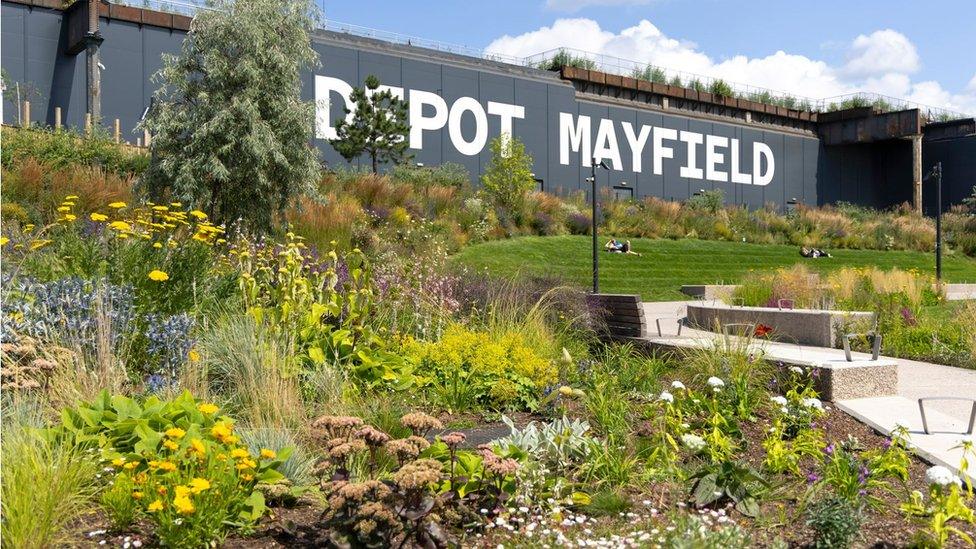
- Published24 June 2023
